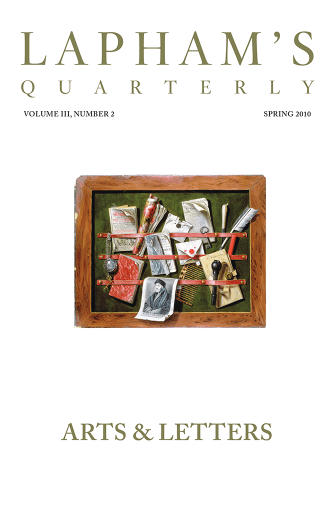This is an edition of Lapham’s Quarterly I read sometime in the last decade. It was after I started highlighting passages in books I was reading but before I started recording those highlights here. I’m finally getting around to adding those highlights.
He is careful of what he reads, for that is what he will write. He is careful of what he learns, because that is what he will know.
This is a simple but extremely powerful quote. In two sentences, it goes a very long way in explaining why the world is as it is. People, tribes, nations are taught what to believe and it is very rare they will change those opinions during their lives. If born into religion chances are you’ll most likely stay in that religion. If you were taught to believe in a certain type of government, then that is what you will believe. The only instance I can think of where I’ve seen opinions (including mine) change are from those who travel and are exposed to new ideas. After that, I would say college can change opinions but does so less often than for those who travel.
Ways of the World
Lu Ji, from “The Art of Writing.”
The poet stands at the center of a universe,
contemplating the enigma,
drawing sustenance
from masterpieces of the past.
Studying the four seasons as they pass,
we sigh;
seeing the inner connectedness of things,
we learn
the innumerable ways of the world.
We mourn leaves torn away
by the cruel hands of autumn;
we honor every tender
bud of spring.
Autumn frost
sends a shudder through the heart;
summer clouds can make the spirit soar.
Learn to recite the classics;
sing in the clear virtue
of ancient masters.
Explore the treasures of the classics
where form and content are born.
Thus moved, I lay aside my books
and take writing brush in hand
to compose this poem.
Art begins when a man, with the purpose of communicating to other people a feeling he once experienced, calls it up again within himself and expresses it by certain external signs.
The man of genius has a soul with greater range, can therefore be struck by the feeling of all beings, is concerned with everything in nature, and never receives an idea that does not evoke a feeling. Everything stirs him and everything is retained within him.
while the scientist sees everything that happens in one point of space, the poet feels everything that happens in one point of time.
A man may take to drink because he feels himself to be a failure, and then fail all the more completely because he drinks. It is rather the same thing that is happening to the English language. It becomes ugly and inaccurate because our thoughts are foolish, but the slovenliness of our language makes it easier for us to have foolish thoughts.
it’s tough to write effectively without common ground between you and your audience. Shared beliefs, like shared experience and shared myths, provide that ground. They give us substance and structure, allow us to interpret and make sense of experience, tell us how we should and shouldn’t behave, help us find significance in our lives.
